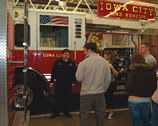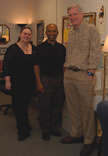| PSYCHOLOGICAL
& QUANTITATIVE FOUNDATIONS
Helping Rural Students
Determine Careers

Students get an inside look and a broader view of career opportunities. |
Captain Steve Stimmel of the
Iowa City Fire Department stood in front of a group of Muscatine
High School ninth graders, describing his work.
“What do you think a fire department does?” he
asked.
Students responded with “put out fires” and “save
people.” When one student asked if they really pull
cats down from trees, Stimmel laughed.
“That’s kind of a misconception,” he said.
The students, part of pilot career education program designed
by Assistant Professor Saba
Ali, toured the fire station, even getting a glimpse
of firefighters’ bunks, watched fire safety videos,
handled fire safety equipment, and learned about career opportunities
in that field.
“There are a wide variety of jobs beyond just throwing
on the boots and helmet and fighting fires,” Stimmel
said, listing fire engineers and inspectors as possible alternatives.
Ali’s program, funded by a grant from the Roy J. Carver
Charitable Trust as well as by the College, is called “A
Future in Iowa: A Career Education Program for Rural High
School Students.” In addition to Muscatine students,
she’s also working with ninth graders in Columbus Junction
and West Liberty.
Ali said her aim with the program is to help students increase
their confidence and link career goals to school.
“Often times, students do not make the explicit link
between how their high school education will be useful in
their future career or occupation. We think by increasing
their understanding of this connection they will become more
engaged in their school work,” she said.
To meet that goal, Ali and several graduate students in Psychological
and Quantitative Foundations meet with students in a series
of workshops. They help the students define their personal
interests and kinds of careers that would employ their interests
and skills. They teach them practical skills, such as using
the Internet to search for jobs, and work on creating resumes,
which are then used in a mock interview.
The last day of the workshop, which varies in length by school
from 3 days to 9 weeks, is the job shadow. In addition to
the fire department, students also have visited the Iowa City
Police Department, The University of Iowa College of Dentistry,
College of Pharmacy, and College of Engineering.
Ali said she hopes to someday expand the program to include
an equivalent workshop for parents of rural high school students.
“It would discuss how they can support their children
in their career interests,” Ali said.
Nick Ganzley, a ninth grader from Muscatine, said he’s
glad he decided to take part in Ali’s program.
“I had a pretty good idea of what I wanted to do, but
I wanted to clear it up, see what I want to be,” he
said. “It really helped me to decide—I wasn’t
sure what kind of engineer I wanted to be, and now I know
I want to be a computer engineer.”

Life’s Work
Gives Back to Friend

Westefeld (R), Wilburn (center), and graduate student Carrie Hudson |
John
Westefeld’s life
changed forever the day a close high school friend committed
suicide. That loss started what Westefeld, a professor
in the Counseling Psychology Program, calls a “lifetime
quest.”
Through research, outreach,
teaching, and personal connections, Westefeld endeavors
to educate people about suicide and support survivors
who have lost a loved one to suicide.
“It’s obviously,
in some ways, a depressing area in which to work,”
he said. “But on the other hand, it’s extremely
rewarding. I have tremendous empathy for people going
through this. I’ve found an area in psychology
that is personally rewarding. This is my way of giving
back to my friend.”
Westefeld’s research
focuses primarily on defining why suicide happens, how
it can be prevented, and what to do after someone completes
suicide. One of his most recent studies focused on high
school teachers’ knowledge of suicide.
“There are things you
can do to prevent suicide,” Westefeld said. “The
biggest is education.”
Westefeld said he incorporates
his suicide prevention and postvention work into most
courses he teaches. He also leads suicide prevention
workshops for community and campus groups.
Ross Wilburn, executive director
of the Johnson County Crisis Center, has worked with
Westefeld and his graduate students through workshops
and center visits. He said he sees Westefeld having
a major impact with his work.
“It’s critical
that we have people such as John working to increase
knowledge about the issue of suicide,” Wilburn
said.
|

|